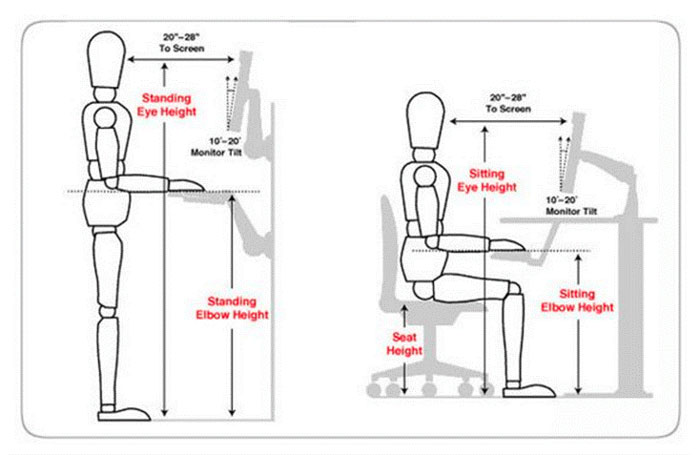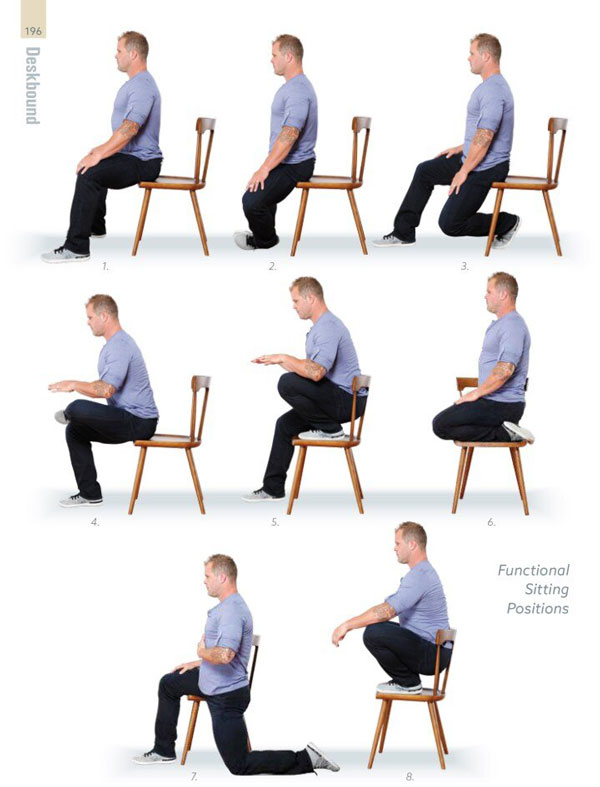You + Your Workstation = Life or Lifeless?
Whether you are at the office or working from home, your workstation determines the demands put on your body during the 8-hour workday. If you have gone from an optimal setup in the office to now working at your dining room table or couch, you have experienced the increased demand that places on your body.
With the uncertainty of when we will be able to return to our ideal workspace in the office, it is vitally important that your home workstation is designed for longevity and comfort.

The Basics
Proper ergonomic setups can be very detailed and may vary from person to person. There are, however, some basic principles that apply to all of us.
- Separate your keyboard and your monitor: If you are using a laptop, get separate keyboard and mouse to create space between you and your screen.
- Position your monitor at eye level: To achieve this, we have two options: raise your monitor or lower yourself. It is easier to put risers underneath your monitor to bring it up to your eye level.
- Stand: Although sitting may feel more comfortable at first, it is not sustainable for 40-hour workweeks until retirement. We will discuss this in more depth later.
Stand vs. Sit
Standing at work is a far better option than sitting because standing is a gateway to movement. (1)
There is much more to proper ergonomics than the position of your devices. No matter how much money you spend on ergonomic devices like chairs, keyboards, mats, and mouse – none of these things can combat poor posture positions.
Our bodies are meant to be upright. As Dr. Kelly Starrett explains it: think about trees. The trees that survive the longest grow upright. These trees have hundreds or thousands of pounds of limbs, leaves, maybe snow or rain to support.
Now, when these trees lean to reach sunlight, say over a river, they still have the weight of the limbs and leaves to support but instead of having the stability of an upright tree, these trees growing out horizontally lose their bracing element and all of that unsupported weight often is too much for the tree to bear. Either the trunk snaps in half or the roots are ripped from the ground.

Image 1. Do you think the tree leaning out over the river or the trees growing upright will survive longer? What happens if there is heavy snow fall, rain, or wind?
The same thing happens when humans sit. We bear extra stress due to losing our foundational stability. When we sit, we lose the natural curves of the spine that are meant to be our core strength and stability.
The muscles of our trunk and lower extremities basically shut off, which a reason why your ankles swell on a long airplane ride – your leg muscles do not contract and there is no squeezing and pumping of the lymphatic fluid in your leg tissue, so you get backed up and congested.

Image 2: Prolonged sitting has more of an effect on your overall health than you may think. How long do you spend sitting?
The image above shows the equivalent of our tree trunk snapping or our roots getting ripped out of the ground. Pain will typically be the first sign or symptom of your body breaking down. If left untreated and the excess stress continues, you can see the organ dysfunctions and diseases that can occur in the body, simply from sitting.
What can I do?
Here are some helpful tips for spending time at your workstation:

Image 3: When you must sit, these are a few functional sitting positions that help to organize your spine and support you upright. We already know standing gives our body the best opportunity to support itself for long periods of time. However, we may need breaks from standing during the day. A rule of thumb is to shoot for 60-80% of your day in the standing position. That leaves 20-40% of your day sitting and when you are sitting choose a position that gives your body the best upright stability.

Image 4: Here are some rough guidelines for keeping your body is a strong ergonomic position while sitting or standing at your workstation. Notice the head is upright with shoulders and arms relaxed to the side.
What if I need help?
At Fremont Spine + Wellness, we specialize in helping people live their best, healthy life for as long as possible. We focus on not only relieving pain and symptoms but correcting misalignments, such as forward head posture, to keep your body strong for as long as possible. Whether you have been sitting at a desk for years or your children are getting into grade school, we can help you and your family reach your health and wellness goals!
References
1. Starrett, K., Starrett, J., & Cordoza, G. (2016). Deskbound: Standing up to a sitting world. Pg. 137 Las Vegas: Victory Belt Publishing.
Image 1. “Leaning Jack” https://www.pinterest.at/pin/489062840783249899/
Image 2. Starrett, K., Starrett, J., & Cordoza, G. (2016). Deskbound: Standing up to a sitting world. Pg. 8 Las Vegas: Victory Belt Publishing.
Image 3. Starrett, K., Starrett, J., & Cordoza, G. (2016). Deskbound: Standing up to a sitting world. Pg. 192 Las Vegas: Victory Belt Publishing.
